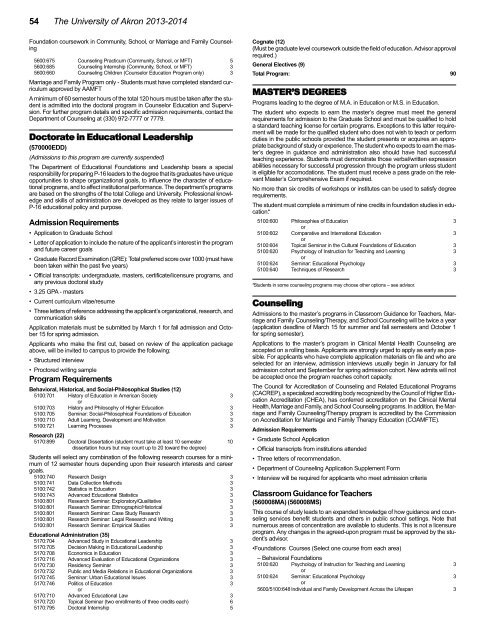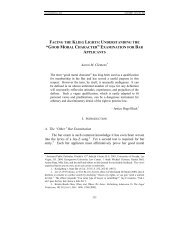2013-2014 GRADUATE BULLETIN - The University of Akron
2013-2014 GRADUATE BULLETIN - The University of Akron
2013-2014 GRADUATE BULLETIN - The University of Akron
Create successful ePaper yourself
Turn your PDF publications into a flip-book with our unique Google optimized e-Paper software.
54 <strong>The</strong> <strong>University</strong> <strong>of</strong> <strong>Akron</strong> <strong>2013</strong>-<strong>2014</strong><br />
Foundation coursework in Community, School, or Marriage and Family Counseling<br />
5600:675 Counseling Practicum (Community, School, or MFT) 5<br />
5600:685 Counseling Internship (Community, School, or MFT) 3<br />
5600:660 Counseling Children (Counselor Education Program only) 3<br />
Marriage and Family Program only - Students must have completed standard curriculum<br />
approved by AAMFT<br />
A minimum <strong>of</strong> 60 semester hours <strong>of</strong> the total 120 hours must be taken after the student<br />
is admitted into the doctoral program in Counselor Education and Supervision.<br />
For further program details and specific admission requirements, contact the<br />
Department <strong>of</strong> Counseling at (330) 972-7777 or 7779.<br />
Doctorate in Educational Leadership<br />
(570000EDD)<br />
(Admissions to this program are currently suspended)<br />
<strong>The</strong> Department <strong>of</strong> Educational Foundations and Leadership bears a special<br />
responsibility for preparing P-16 leaders to the degree that its graduates have unique<br />
opportunities to shape organizational goals, to influence the character <strong>of</strong> educational<br />
programs, and to affect institutional performance. <strong>The</strong> department’s programs<br />
are based on the strengths <strong>of</strong> the total College and <strong>University</strong>. Pr<strong>of</strong>essional knowledge<br />
and skills <strong>of</strong> administration are developed as they relate to larger issues <strong>of</strong><br />
P-16 educational policy and purpose.<br />
Admission Requirements<br />
• Application to Graduate School<br />
• Letter <strong>of</strong> application to include the nature <strong>of</strong> the applicant’s interest in the program<br />
and future career goals<br />
• Graduate Record Examination (GRE): Total preferred score over 1000 (must have<br />
been taken within the past five years)<br />
• Official transcripts: undergraduate, masters, certificate/licensure programs, and<br />
any previous doctoral study<br />
• 3.25 GPA - masters<br />
• Current curriculum vitae/resume<br />
• Three letters <strong>of</strong> reference addressing the applicant’s organizational, research, and<br />
communication skills<br />
Application materials must be submitted by March 1 for fall admission and October<br />
15 for spring admission.<br />
Applicants who make the first cut, based on review <strong>of</strong> the application package<br />
above, will be invited to campus to provide the following:<br />
• Structured interview<br />
• Proctored writing sample<br />
Program Requirements<br />
Behavioral, Historical, and Social-Philosophical Studies (12)<br />
5100:701 History <strong>of</strong> Education in American Society 3<br />
or<br />
5100:703 History and Philosophy <strong>of</strong> Higher Education 3<br />
5100:705 Seminar: Social-Philosophical Foundations <strong>of</strong> Education 3<br />
5100:710 Adult Learning, Development and Motivation 3<br />
5100:721 Learning Processes 3<br />
Research (22)<br />
5170:899 Doctoral Dissertation (student must take at least 10 semester 10<br />
dissertation hours but may count up to 20 toward the degree)<br />
Students will select any combination <strong>of</strong> the following research courses for a minimum<br />
<strong>of</strong> 12 semester hours depending upon their research interests and career<br />
goals.<br />
5100:740 Research Design 3<br />
5100:741 Data Collection Methods 3<br />
5100:742 Statistics in Education 3<br />
5100:743 Advanced Educational Statistics 3<br />
5100:801 Research Seminar: Exploratory/Qualitative 3<br />
5100:801 Research Seminar: Ethnographic/Historical 3<br />
5100:801 Research Seminar: Case Study Research 3<br />
5100:801 Research Seminar: Legal Research and Writing 3<br />
5100:801 Research Seminar: Empirical Studies 3<br />
Educational Administration (35)<br />
5170:704 Advanced Study in Educational Leadership 3<br />
5170:705 Decision Making in Educational Leadership 3<br />
5170:708 Economics in Education 3<br />
5170:716 Advanced Evaluation <strong>of</strong> Educational Organizations 3<br />
5170:730 Residency Seminar 3<br />
5170:732 Public and Media Relations in Educational Organizations 3<br />
5170:745 Seminar: Urban Educational Issues 3<br />
5170:746 Politics <strong>of</strong> Education 3<br />
or<br />
5170:710 Advanced Educational Law 3<br />
5170:720 Topical Seminar (two enrollments <strong>of</strong> three credits each) 6<br />
5170:795 Doctoral Internship 5<br />
Cognate (12)<br />
(Must be graduate level coursework outside the field <strong>of</strong> education. Advisor approval<br />
required.)<br />
General Electives (9)<br />
Total Program: 90<br />
MASTER’S DEGREES<br />
Programs leading to the degree <strong>of</strong> M.A. in Education or M.S. in Education.<br />
<strong>The</strong> student who expects to earn the master’s degree must meet the general<br />
requirements for admission to the Graduate School and must be qualified to hold<br />
a standard teaching license for certain programs. Exceptions to this latter requirement<br />
will be made for the qualified student who does not wish to teach or perform<br />
duties in the public schools provided the student presents or acquires an appropriate<br />
background <strong>of</strong> study or experience. <strong>The</strong> student who expects to earn the master’s<br />
degree in guidance and administration also should have had successful<br />
teaching experience. Students must demonstrate those verbal/written expression<br />
abilities necessary for successful progression through the program unless student<br />
is eligible for accomodations. <strong>The</strong> student must receive a pass grade on the relevant<br />
Master’s Comprehensive Exam if required.<br />
No more than six credits <strong>of</strong> workshops or institutes can be used to satisfy degree<br />
requirements.<br />
<strong>The</strong> student must complete a minimum <strong>of</strong> nine credits in foundation studies in education.*<br />
5100:600 Philosophies <strong>of</strong> Education 3<br />
or<br />
5100:602 Comparative and International Education 3<br />
or<br />
5100:604 Topical Seminar in the Cultural Foundations <strong>of</strong> Education 3<br />
5100:620 Psychology <strong>of</strong> Instruction for Teaching and Learning 3<br />
or<br />
5100:624 Seminar: Educational Psychology 3<br />
5100:640 Techniques <strong>of</strong> Research 3<br />
*Students in some counseling programs may choose other options – see advisor.<br />
Counseling<br />
Admissions to the master’s programs in Classroom Guidance for Teachers, Marriage<br />
and Family Counseling/<strong>The</strong>rapy, and School Counseling will be twice a year<br />
(application deadline <strong>of</strong> March 15 for summer and fall semesters and October 1<br />
for spring semester).<br />
Applications to the master’s program in Clinical Mental Health Counseling are<br />
accepted on a rolling basis. Applicants are strongly urged to apply as early as possible.<br />
For applicants who have complete application materials on file and who are<br />
selected for an interview, admission interviews usually begin in January for fall<br />
admission cohort and September for spring admission cohort. New admits will not<br />
be accepted once the program reaches cohort capacity.<br />
<strong>The</strong> Council for Accreditation <strong>of</strong> Counseling and Related Educational Programs<br />
(CACREP), a specialized accrediting body recognized by the Council <strong>of</strong> Higher Education<br />
Accreditation (CHEA), has conferred accreditation on the Clinical Mental<br />
Health, Marriage and Family, and School Counseling programs. In addition, the Marriage<br />
and Family Counseling/<strong>The</strong>rapy program is accredited by the Commission<br />
on Accreditation for Marriage and Family <strong>The</strong>rapy Education (COAMFTE).<br />
Admission Requirements<br />
• Graduate School Application<br />
• Official transcripts from institutions attended<br />
• Three letters <strong>of</strong> recommendation.<br />
• Department <strong>of</strong> Counseling Application Supplement Form<br />
• Interview will be required for applicants who meet admission criteria<br />
Classroom Guidance for Teachers<br />
(560008MA) (560008MS)<br />
This course <strong>of</strong> study leads to an expanded knowledge <strong>of</strong> how guidance and counseling<br />
services benefit students and others in public school settings. Note that<br />
numerous areas <strong>of</strong> concentration are available to students. This is not a licensure<br />
program. Any changes in the agreed-upon program must be approved by the student’s<br />
advisor.<br />
•Foundations Courses (Select one course from each area)<br />
– Behavioral Foundations<br />
5100:620 Psychology <strong>of</strong> Instruction for Teaching and Learning 3<br />
or<br />
5100:624 Seminar: Educational Psychology 3<br />
or<br />
5600/5100:648 Individual and Family Development Across the Lifespan 3

















